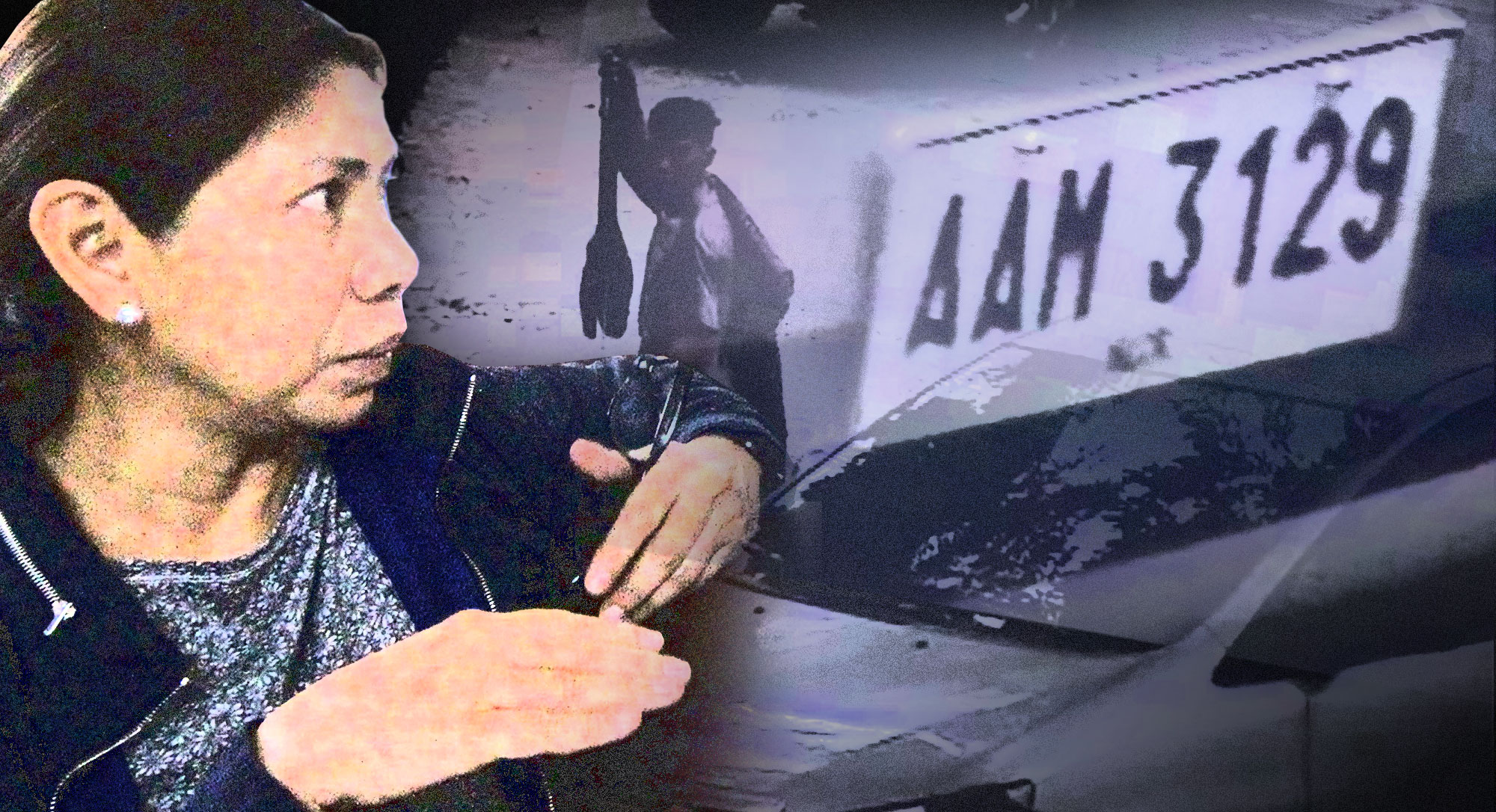Courage’s Tonette Dizon: Defying an imminent threat
Antonieta Setias-Dizon, a longtime leader of public-sector workers, has sought sanctuary inside the Integrated Bar of the Philippines (IBP) Building in Ortigas Center, Pasig City for fear of being abducted, or worse, killed, by suspected military elements staked out near the building since afternoon of July 14.


She has good reason to fear the worst.
Antonieta Setias-Dizon, a longtime leader of public-sector workers, has sought sanctuary inside the Integrated Bar of the Philippines (IBP) Building in Ortigas Center, Pasig City for fear of being abducted, or worse, killed, by suspected military elements staked out near the building since afternoon of July 14.
For the past few weeks, Tonette—as she is called by members of the Confederation for Unity, Recognition and Advancement of Government Employees (Courage)–has been threatened and doggedly tailed by the same sports utility vehicle (SUV). Before that, she was harassed and threatened by a military agent.

The SUV was a silver Toyota Innova with the plate number AAM 3129. Tonette first noticed the SUV on July 6, when she drove her grandson to school. The next day, using the same vehicle, she went to Manila Hotel to attend the inauguration of her sister, lawyer Rosario Setias-Reyes, as IBP president. She again saw the SUV directly tailing her car.
(Later, an IBP Governor was able to trace the owner of the SUV: one Norberto delos Reyes, with address Rm. 83, Condo B, Camp Crame.)
A few days later, on July 10, she used a different car. Again, the same SUV tailed her. The next day, July 11, accompanied by her sister to the IBP building, they were followed again by the same vehicle. On July 12, while on a car with her family, Tonette again noticed the SUV, this time convoyed with a motorcycle.
On the morning of July 14, Tonette was with Courage leaders as well as leaders of other progressive organizations at the Supreme Court building. They filed a petition for a writ of amparo protection, as many Courage leaders and members, and that of other groups of late have beeng complaining of harassment and intimidation by military elements.
After the filing, Tonette, with her sister Atty. Rose, drove to the IBP building in Pasig City. Again, they were tailed by the same SUV. This time, though, it convoyed with two other motorcycles and a red Pajero. The vehicles parked in a paid parking lot in front of the IBP building. Tonette saw a few men alight the vehicles. Some carried shoulder bags.
Thus began the long day for Tonette and her sister, Atty. Rose.

Targeted
“My sister wanted to confront whoever were in the vehicles. But when we saw the men, we realized they looked like they could not be reasoned with. We decided it was not worth the risk confronting them,” said Tonette.
From the window of the IBP building, she took some pictures of the SUV and one of the men who alighted the Innova.
“I realized that any time, they can enter the building and take me,” Tonette recounted. She recalled the illegal arrest of fellow Courage leaders Raul Camposano and Randy Vegas in December 2012. Randy and Raul were on their way to meet union leaders from Metro Manila Development Authority (MMDA). “They never saw the arrests coming. And all that they did was be involved in the fight of MMDA workers for benefits,” she added.
But the nature of the surveillance—the consistent tailing and harassment, dating back to May 6 when Tonette was first approached by a suspected military agent to threaten her until the July 14 stake-out—made her and her fellow Courage activists suspect that the operation was more than just to arrest her. In all probability, the men were out to abduct her—which was the fate of hundreds of activists from Jonas Burgos in Quezon City in 2006 to Aida Seisa in Mindanao a month ago—or even kill her.
Thankfully, from late in the evening of July 14 until the time this article was written, dozens of activists and supporters flocked to the IBP building. Many of them stayed vigil outside.
Some accompanied Tonette, Atty. Rose and the other IBP staff and Courage leaders inside the IBP office. Progressive lawmakers Terry Ridon and Emmi de Jesus, as well as former Bayan Muna Rep. Satur Ocampo, also rushed to the IBP building to lend valuable support to Tonette.

Public service
Who is Antonieta Sietas-Dizon, and why is the military—presumably under orders of the Aquino administration—apparently targeting her? Tonette said it probably has to do with her long-time work as a public servant and organizer of public sector workers.
“I came into government, ironically, because of Cory Aquino,” she recounted. It was Cory, Tonette said, who first inspired her to enter public service in 1986. Imbued with youthful idealism and swept up by the “Cory euphoria” after the People Power uprising in February 1986, Tonette joined the OWWA to help overseas Filipino workers (OFWs).
“I even recruited my fellow members of UPSCA (University of the Philippines Student Catholic Action, the university’s largest Catholic organization) in UP Manila to join me in OWWA,” Tonette said.
Barely a year into public service, Tonette already realized the need to organize government employees and unite them to fight for their rights and contribute to social change. In 1987, she was among the first officers of Courage. Since then, she has been involved in public-sector organizing and union-building.
“As part of OWWA, I was able to travel all over the world to meet migrant Filipinos in need,” she said. “That is how I began developing a deeper understanding of their plight.” She gradually rose to the ranks to become one of the agency’s directors. Later, Tonette even became an OIC executive director of one of DOLE’s staff agencies, the Bureau of Rural Workers, where she was then exposed to the plight of rural-based workers and peasants.
Instead of enriching herself as a few state middle managers are known to do, Tonette came to understand the connections between public-sector workers’ struggles and the overall people’s struggle for democratic rights. She even began organizing fellow middle managers.
“We became involved in the campaign against the privatization of Metropolitan Waterworks and Sewerage System (MWSS). We picketed Malacanang as well as the Senate in 1989,” she said. During that time, she attended a World Bank conference. Instead of defending the first Aquino administration’s privatization policies, she criticized it in public. “Internationally, Courage became well-known for its campaign against MWSS privatization,” Tonette added.
She said she even participated in the protests against the the RP-US Military Bases Agreement in 1990-91.
Tonette later became Courage’s deputy secretary-general and a member of its Council of Advisers until today. “I availed of early retirement in 2003. I no longer wanted to be tied up with government as I criticized its policies,” she said. Tonette began to devote all of her time to public-sector organizing.
In addition to her work in Courage, Tonette said she is now the president of the Majorem Consultancy and Marketing Services Inc. and is an independent Disaster Risk Reduction consultant. Through these initiatives, Tonette was able to reach out more to marginalized sectors of Philippine society.
Recently, because of her background in government, Tonette was able to help Courage gather data to expose the Aquino administration’s misuse of funds that were supposedly for government employees’ benefits for its Disbursement Acceleration Program (DAP). Tonette has also been involved in various campaigns, from the campaign against heavy taxation of employees’ benefits, to the call for a National Minimum Wage for workers in the public and private sector.
“We have always been in the forefront of the struggle for the rights of government employees and the people,” Tonette said, “but it is only today that I experienced this kind of political repression.” The irony of an Aquino leading a government that employs Marcosian tactics against its critics is not lost on her.
Tonette said she fears for her life and even that of her family. But she is determined to defy the threats, knowing fully well that she is never alone in the fight.


